|
|
|
Sort Order |
|
|
|
Items / Page
|
|
|
|
|
|
|
| Srl | Item |
| 1 |
ID:
121214
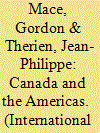

|
|
|
|
|
| Publication |
2012.
|
| Summary/Abstract |
Canada's minister of state for the Americas and consular affairs, Diane
Ablonczy, opened the December 2011 ministerial dialogue on the Americas
with the questions, "How is Canada doing in the Americas? How can we
do better?"1
The contributions to this special issue of International Journal
propose to frame some answers to these questions.
|
|
|
|
|
|
|
|
|
|
|
|
|
|
|
|
| 2 |
ID:
121224


|
|
|
|
|
| Publication |
2012.
|
| Summary/Abstract |
The Arctic Council is a high-level, mainly intergovernmental forum for
cooperation, coordination, and interaction among Arctic states,1
indigenous
groups, and interested parties of two issue areas, sustainable development in
the Arctic and the protection and study of the fragile Arctic ecosystem. The
council is poorly understood and little advertised. And while it cannot enact
binding legislation (except among the member states) or discuss issues of
military security, these supposed "weaknesses" have actually helped to forge
consensus in other important issue areas.
|
|
|
|
|
|
|
|
|
|
|
|
|
|
|
|
| 3 |
ID:
121218
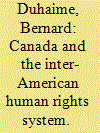

|
|
|
|
|
| Publication |
2012.
|
| Summary/Abstract |
When Canada became a Member of the Organization of American States
(OAS) in 1990, most of Latin America was at a crossroad in a post-cold
war transition from authoritarian regimes to democracies. The Canadian
government played a fundamental role in the creation and development of
the organization's unit for the promotion of democracy, as well as of other
similar initiatives, in this period. This mark of leadership would have an
important impact on the organization later on, including regarding the
adoption of the 2001 Inter-American Democratic Charter, which attests to the importance of human rights for democracy and vice-versa. In fact, the
promotion of democratic processes and the consolidation of democratic
institutions, as well as the promotion and protection of human rights, are
certainly among the OAS's most signi?cant successes in the institution's
recent history.1
|
|
|
|
|
|
|
|
|
|
|
|
|
|
|
|
| 4 |
ID:
121216


|
|
|
|
|
| Publication |
2012.
|
| Summary/Abstract |
Since 1940 the Americas have been fairly peaceful compared to other regions
of the world. Although Central America was racked by extremely violent civil
wars during the 1980s, over the past few decades the region as a whole has
not experienced many military con?icts between states. Barely a handful of
the various territorial disputes, past or present, have led to open warfare. The
last signi?cant episode, the 1995 war between Peru and Ecuador, lasted no
more than a week. Yet this relative tranquillity must not obscure the fact that
over the years, the regional security agenda has undergone major changes.
|
|
|
|
|
|
|
|
|
|
|
|
|
|
|
|
| 5 |
ID:
121225
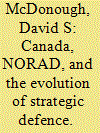

|
|
|
|
|
| Publication |
2012.
|
| Summary/Abstract |
Canada proved to be a reliable and cooperative partner of the Americans
on a variety of air defence initiatives in the early Cold War. Both countries
constructed a dense network of radar lines, prioritized their respective air
defence forces, and eventually agreed to a binational North American Air
Defence Command (NORAD), imbued with the operational control of both
countries' air defence forces. However, Canada's role in strategic defence
was just as quickly challenged by the development of intercontinental
ballistic missiles. NORAD's raison d'être shifted to the early warning and
tracking of these long-range delivery systems, even as Washington became
increasingly infatuated with the potential of missile defences from the late
1960s onward. Importantly, Canada consistently refrained from cooperating
with the United States on strategic missile defence.
|
|
|
|
|
|
|
|
|
|
|
|
|
|
|
|
| 6 |
ID:
121220
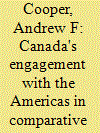

|
|
|
|
|
| Publication |
2012.
|
| Summary/Abstract |
Recent Canadian prime ministers have embraced the hemisphere of the
Americas, albeit in a differentiated and uneven fashion. Brian Mulroney
is commonly credited with "discovering" the Americas largely through
the decision to ?nally join the Organization of American States (OAS)
in 1989.1
Jean Chrétien pushed the "more amigos the better" approach
through support for the Free Trade Area of the Americas, the summit of
the Americas process, and the targeting of Team Canada activities in the region.2
|
|
|
|
|
|
|
|
|
|
|
|
|
|
|
|
| 7 |
ID:
121222
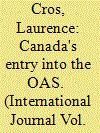

|
|
|
|
|
| Publication |
2012.
|
| Summary/Abstract |
Since the mid-1990s, identity has re-emerged as a key concept within
international relations theory. The social constructivist view of international
relations considers cultural variables, and particularly identity, as prime
agents in states' decision-making. For constructivists, identity is "the core
building block of interest, national or otherwise," and therefore they see
national identity and the national interests that derive from it as central in
state action1
. In the case of Canada, the concept of identity was, in the past,
central to the analysis of history.
|
|
|
|
|
|
|
|
|
|
|
|
|
|
|
|
| 8 |
ID:
121221
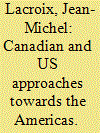

|
|
|
|
|
| Publication |
2012.
|
| Summary/Abstract |
The purpose of this article1
is to envisage the evolution of the relations
between Canada and the United States with their southern neighbours,
with the objective of comparing the respective attitudes of the two North
American partners vis-à-vis Latin America. Under the administration
of George W. Bush, anti-Americanism intensi?ed worldwide. Nothing
comparable occurred in the case of Canada: as a middle power with a legacy
of peacekeeping initiatives in its recent past, it naturally came to be perceived
in a more positive way. This difference led many to wonder whether Canada
might be contemplated, in the Americas as elsewhere, as representing
somehow a "more acceptable" version of the US. Or at least it did so until
the past few years, during which time it has been said that the elections of
Stephen Harper in 2006 and of Barack Obama in 2008 have brought about
a shift in the two countries' "images." This article seeks to test this claim,
with special reference to the relations of each with Latin America.
|
|
|
|
|
|
|
|
|
|
|
|
|
|
|
|
| 9 |
ID:
121226
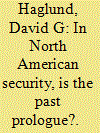

|
|
|
|
|
| Publication |
2012.
|
| Summary/Abstract |
There is nothing unusual about positing security issues as "problems"; after
all, it was not so terribly long ago that the central dilemma in international
security regularly, and not incorrectly, bore the label, the "German Problem"
(in some variants, the "German Question").1
I have myself, on occasion,
even employed the concept of problem to frame discussions of historical
and contemporary policy dilemmas associated with aspects of North
American security-albeit on the understanding that somehow the source
of the contention inhered in actions or perceptions linked to American
policymakers, the assumption being that it was Canadians who were left
facing the "problem" in question.
|
|
|
|
|
|
|
|
|
|
|
|
|
|
|
|
| 10 |
ID:
121217


|
|
|
|
|
| Publication |
2012.
|
| Summary/Abstract |
Poverty and persistent inequality in income distribution remain a key
concern in Latin America. The recent ?nancial and economic crisis has retriggered a debate on the mechanisms and policies required to improve the
socioeconomic situation in this region characterized by the worst income
distribution in the world.
|
|
|
|
|
|
|
|
|
|
|
|
|
|
|
|
| 11 |
ID:
121219
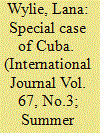

|
|
|
|
|
| Publication |
2012.
|
| Summary/Abstract |
Cuba is special, an anomaly in the hemisphere. The most infamous reason
for Cuba's outlying status is that this country of 11 million has had a hostile
relationship with the United States for over ?ve decades. For much of
this time, Havana was isolated by many other states in the region. Cuba's
relationship with Canada is unique in this regard since the ties between
Havana and Ottawa were never severed. This bilateral relationship remained
distinct despite pressure from Washington and changes of Canadian
government. Canada, meanwhile, has maintained its close allegiance with
the United States and has attempted at various times to use its friendship
with both states to bring the two sides together. Canada has also advocated
Cuba's inclusion in the region's international organizations.
|
|
|
|
|
|
|
|
|
|
|
|
|
|
|
|
| 12 |
ID:
121223
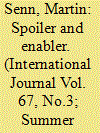

|
|
|
|
|
| Publication |
2012.
|
| Summary/Abstract |
The topic of nuclear disarmament has made an impressive comeback
since the four elder statesmen Shultz, Perry, Kissinger, and Nunn raised
the issue in their 2007 op-ed piece in The Wall Street Journal.
1
Embraced by
its advocates as the only safeguard against the use of nuclear weapons and
rejected by its opponents as a dangerous idealism, global nuclear zero has
been debated thoroughly in academic and policy-making circles.
|
|
|
|
|
|
|
|
|
|
|
|
|
|
|
|
| 13 |
ID:
121215
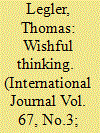

|
|
|
|
|
| Publication |
2012.
|
| Summary/Abstract |
Since the Mulroney government oriented Canada decisively toward
the Americas by joining the Organization of American States in 1990,
democracy promotion in the region has been an important activity, at least
rhetorically, of both Conservative and Liberal governments.1
This has never
been more so than with the present Conservative government of Prime
Minister Stephen Harper, who signaled early on that democracy support
would be both a key priority for its foreign policy and, more speci?cally, for
Canada's reengagement with the Americas.
|
|
|
|
|
|
|
|
|
|
|
|
|
|
|
|
|
|
|
|
|